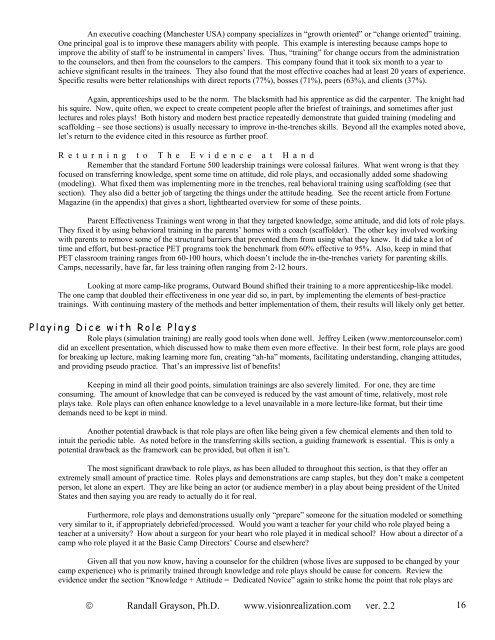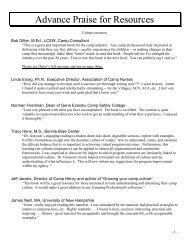Taking Camp Staff Training From Good To Best ... - Vision Realization
Taking Camp Staff Training From Good To Best ... - Vision Realization
Taking Camp Staff Training From Good To Best ... - Vision Realization
Create successful ePaper yourself
Turn your PDF publications into a flip-book with our unique Google optimized e-Paper software.
An executive coaching (Manchester USA) company specializes in “growth oriented” or “change oriented” training.<br />
One principal goal is to improve these managers ability with people. This example is interesting because camps hope to<br />
improve the ability of staff to be instrumental in campers’ lives. Thus, “training” for change occurs from the administration<br />
to the counselors, and then from the counselors to the campers. This company found that it took six month to a year to<br />
achieve significant results in the trainees. They also found that the most effective coaches had at least 20 years of experience.<br />
Specific results were better relationships with direct reports (77%), bosses (71%), peers (63%), and clients (37%).<br />
Again, apprenticeships used to be the norm. The blacksmith had his apprentice as did the carpenter. The knight had<br />
his squire. Now, quite often, we expect to create competent people after the briefest of trainings, and sometimes after just<br />
lectures and roles plays! Both history and modern best practice repeatedly demonstrate that guided training (modeling and<br />
scaffolding – see those sections) is usually necessary to improve in-the-trenches skills. Beyond all the examples noted above,<br />
let’s return to the evidence cited in this resource as further proof.<br />
Returning to The Evidence at Hand<br />
Remember that the standard Fortune 500 leadership trainings were colossal failures. What went wrong is that they<br />
focused on transferring knowledge, spent some time on attitude, did role plays, and occasionally added some shadowing<br />
(modeling). What fixed them was implementing more in the trenches, real behavioral training using scaffolding (see that<br />
section). They also did a better job of targeting the things under the attitude heading. See the recent article from Fortune<br />
Magazine (in the appendix) that gives a short, lighthearted overview for some of these points.<br />
Parent Effectiveness <strong>Training</strong>s went wrong in that they targeted knowledge, some attitude, and did lots of role plays.<br />
They fixed it by using behavioral training in the parents’ homes with a coach (scaffolder). The other key involved working<br />
with parents to remove some of the structural barriers that prevented them from using what they knew. It did take a lot of<br />
time and effort, but best-practice PET programs took the benchmark from 60% effective to 95%. Also, keep in mind that<br />
PET classroom training ranges from 60-100 hours, which doesn’t include the in-the-trenches variety for parenting skills.<br />
<strong>Camp</strong>s, necessarily, have far, far less training often ranging from 2-12 hours.<br />
Looking at more camp-like programs, Outward Bound shifted their training to a more apprenticeship-like model.<br />
The one camp that doubled their effectiveness in one year did so, in part, by implementing the elements of best-practice<br />
trainings. With continuing mastery of the methods and better implementation of them, their results will likely only get better.<br />
Playing Dice with Role Plays<br />
Role plays (simulation training) are really good tools when done well. Jeffrey Leiken (www.mentorcounselor.com)<br />
did an excellent presentation, which discussed how to make them even more effective. In their best form, role plays are good<br />
for breaking up lecture, making learning more fun, creating “ah-ha” moments, facilitating understanding, changing attitudes,<br />
and providing pseudo practice. That’s an impressive list of benefits!<br />
Keeping in mind all their good points, simulation trainings are also severely limited. For one, they are time<br />
consuming. The amount of knowledge that can be conveyed is reduced by the vast amount of time, relatively, most role<br />
plays take. Role plays can often enhance knowledge to a level unavailable in a more lecture-like format, but their time<br />
demands need to be kept in mind.<br />
Another potential drawback is that role plays are often like being given a few chemical elements and then told to<br />
intuit the periodic table. As noted before in the transferring skills section, a guiding framework is essential. This is only a<br />
potential drawback as the framework can be provided, but often it isn’t.<br />
The most significant drawback to role plays, as has been alluded to throughout this section, is that they offer an<br />
extremely small amount of practice time. Roles plays and demonstrations are camp staples, but they don’t make a competent<br />
person, let alone an expert. They are like being an actor (or audience member) in a play about being president of the United<br />
States and then saying you are ready to actually do it for real.<br />
Furthermore, role plays and demonstrations usually only “prepare” someone for the situation modeled or something<br />
very similar to it, if appropriately debriefed/processed. Would you want a teacher for your child who role played being a<br />
teacher at a university? How about a surgeon for your heart who role played it in medical school? How about a director of a<br />
camp who role played it at the Basic <strong>Camp</strong> Directors’ Course and elsewhere?<br />
Given all that you now know, having a counselor for the children (whose lives are supposed to be changed by your<br />
camp experience) who is primarily trained through knowledge and role plays should be cause for concern. Review the<br />
evidence under the section “Knowledge + Attitude = Dedicated Novice” again to strike home the point that role plays are<br />
© Randall Grayson, Ph.D. www.visionrealization.com ver. 2.2 16





